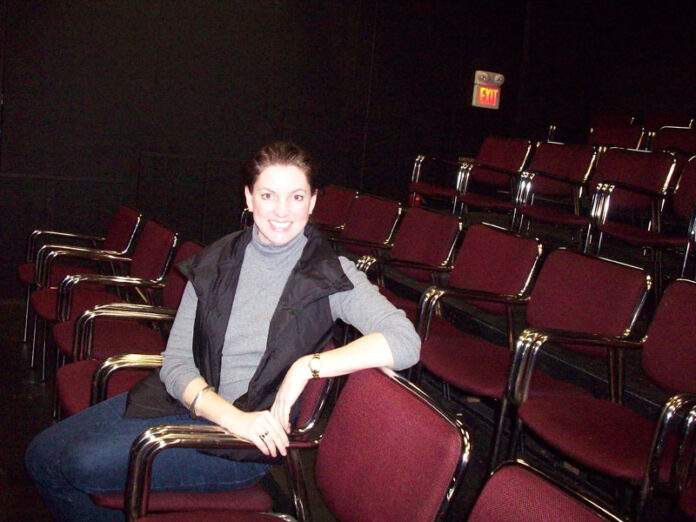
Ginger Poole’s association with now-defunct Mill Mountain Theatre began in 2006 when she appeared as an actor in Mill Mountain’s production of the comedy “Don’t Dress for Dinner.” From there, she choreographed another production, “Big River,” and went on to do “The Stinky Cheeseman,” “Into the Woods, “The Spitfire Grill,” and “Lost Highways.”
In addition to her work as an actor, director, and choreographer, Poole has taught acting classes there. In the summer of 2008 she was asked to become Mill Mountain’s Director of Education, succeeding Pat Wilhelms – now in charge of the children’s theater program the Taubman Museum of Art. More recently, she was given another hat to wear as well: Managing Director, in which capacity Poole will oversee Mill Mountain during its current “reinvention” process.
Currently Mill Mountain’s only salaried staff member, Poole works with two other people, both of whom are employed as contract laborers: Susan Braden, Mill Mountain’s Musical Director, who works with Poole on the Mill Mountain Theatre Conservatory, the theatre’s educational program, and Jennifer Jamison, Director of Development.
A professional Equity actor and the holder of an M.F.A. in Acting from the University of Southern Mississippi, Poole came to Mill Mountain Theatre after a stint at Flat Rock Playhouse, the State Theater of North Carolina, where she taught for their Apprentice and Community programs in acting, dance, and musical theatre. In addition to teaching at her alma mater, Poole has taught at Western Carolina University, William Carey College and The Mississippi University for Women.
Financial problems forced Mill Mountain to close its doors in January 2009. “That’s when we did release the majority of our employees,” says Poole. “We just had to cut it down to barebones to make even the possibility of a future happen.”
Poole feels the closing resulted – not from one single cause – but grew over the past decade “[due to] some financial choices and [reduced] giving.” What didn’t help says Poole, was “doing really large scale productions when we might not have been [able to afford it]. And, of course, the economy didn’t help in the past [few] years.” In an effort to attract bigger audiences, Mill Mountain often took on more lavish productions that some critics claimed were a financial strain.
Mill Mountain Theatre is about to begin a campaign that Poole says will clue the community in as to its future. “We’ve never turned away a donation,” she says, “but we also haven’t solicited as [often] in the past year because we needed the time to get our plan together, shoot holes in it, make sure that it was thorough and could stand on its own before we felt comfortable with presenting it to the community.”
At the present time, Mill Mountain’s primary source of revenue is an educational program, which, in Poole’s words, “has doubled and now, I can say, tripled in numbers from before we closed.” This program, the Mill Mountain Theatre Conservatory, has just wrapped up a successful summer season.
Center in the Square itself is about to experience a major renovation project after a capital campaign and the approval of tax credits are in place. Depending on that timing, Mill Mountain Theatre currently plans to reopen sometime during 2012 or 2013, and with a smaller staff.
The latter, Poole says, “doesn’t necessarily mean a smaller season. We’re still going to really strive to raise the bar as far as the arts here in the Valley. We will be working with professionals, we will maintain our Equity relationship with New York, which means we can hire professional actors. We will have a smaller scaled staff but will be working more [with] contract laborers – we won’t house twenty three salaried employees.”
And despite being “closed” at present, Mill Mountain is constantly receiving inquires from people who either worked there or desire to, asking how they can help or can they audition for Mill Mountain productions. This, Poole says, reflects the theater’s fabulous nationwide reputation within professional theatrical circles—“not just in New York but all the way to Los Angeles, Seattle, Chicago, Miami, Atlanta. It still has a very proud name.”
Regarding her future plans, Poole says she will stay in Roanoke. “First of all, I’ve fallen in love with the city and I think that me staying on as that last standing soldier, I’ve got to see this process through. I think I’m going to be Mill Mountain’s biggest cheerleader for a long, long time, and I’ve got to see this project happen. I’ve got a phenomenal board standing behind me; they’re all hands-on and we’re going to [make] this happen. I love Roanoke, and I think—and I hope—I’ll be here for a long time.”
By Gene Marrano [email protected]

